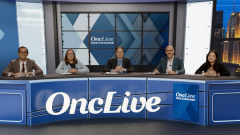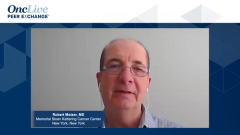
Factors in Selecting First-Line Therapy for Patients With Advanced Clear Cell RCC
A brief discussion on the patient and disease characteristics that help to inform selection of best therapy for patients with advanced clear cell renal cell carcinoma.
Episodes in this series

Transcript:
Brian I. Rini, MD:I think as you heard, we’ve mentioned every single regimen. That [is] sort of the state of the field, as we all have our different biases. I tend to be an IO-TKI [immuno-oncology–tyrosine kinase inhibitor] person because of disease control, ease to give, low primary progression, all the reasons mentioned. I give ipilimumab-nivolumab to anybody with sarcomatoid, as you all know, there’s really good data that [it] has an especially high and durable response rate in that population. Tends to be that young, healthier patient. Sort of the first note of the algorithm is, is this patient eligible for ipilimumab? Because if they’re not, and a lot of people who walk into my clinic aren’t, then I pick my favorite IO-TKI. I was giving a lot of axitinib-pembrolizumab. I’ve certainly given a little more lenvatinib-pembrolizumab, but, and I want to get to toxicity in a second, the toxicity is limiting as well. So I think, of the 4 regimens, 4 doublets shown to increase survival, I could probably stand up in a debate and take any one of them.
Elizabeth Plimack, MD, MS: I bet you could.
Brian I. Rini, MD:I think all of us could do that. So it just shows you that it’s not a right or wrong choice. As others have said, I think familiarity with the regimen and knowing half-life of drug and dosing. The TKIs took totally different dosing strategies in these trials for a number of reasons. Familiarity is really sort of key. The data at ASCO [the American Society of Clinical Oncology meeting], for me, I think the rising hazard ratios are a reflection of more patients getting subsequent therapy. To your point about when the trials were conducted and availability, I don’t actually know the number of patients in [CheckMate] 214 who randomized to sunitinib who got nivolumab. I don’t know if you know that number.
Elizabeth Plimack, MD, MS: No. I don’t think they were able to capture a lot of it that well. Again, this was an early trial, and it wasn’t expected to do as well as it did.
Brian I. Rini, MD:I’m not sure I’ve ever seen that number. Maybe that’s why, to your earlier point. I don’t think the data are going to radically change. None of us said they were going to radically change, and I don’t think on a community practice level or other level that there’s going to be a lot of people who radically change based on it. I think the rising hazard ratios reflect therapy, but I will, in defense of ipilimumab-nivolumab a little bit, [say] those responses are really durable. Which is immune therapy. That’s everything that’s great about immune therapy, these durable responses. So I can see the argument that, I have this patient who wants a durable response of course, and leaning toward ipilimumab-nivolumab, and if you were there for the discussion, there was a nice, heated exchange from people about this. So I think we’re in for a lot of discussion around this topic, and that’s good. That’s what we should be doing, is sort of discussing. I wanted to cover, Stephanie, because you brought up bone metastasis. So it sounds like in a patient with bone metastases, you might lean more toward cabozantinib-nivolumab for the reasons you mentioned. So anybody else want to dive in and say, “I choose this regimen for these organ-specific metastases?” I didn’t hear anybody else say that?
Elizabeth Plimack, MD, MS: Cabozantinib just has this link to bone, kind of from history and from the prostate cancer studies. I think we kind of gravitate to that and want to believe that. For a really bad bone metastasis, I still think lenvatinib-pembrolizumab is going to give you the best overall response. I don’t parse by where they are. I agree with Eric.
Brian I. Rini, MD:On the brain or liver or…?
Elizabeth Plimack, MD, MS: Right. Liver’s bad, and a lot of metastases are bad. Those are things that turn you to the regimen with the highest response rate and the lowest primary progression rate. But I don’t pick an organ-specific [regimen].
Brian I. Rini, MD:Does anybody? Eric, do you?
Eric Jonasch, MD: No. I agree in principle with that. I don’t think we have the same granularity with lenvatinib-pembrolizumab as we do with cabozantinib-nivolumab, but I think both regimens, for those more troublesome organ sites, I think are reasonable.
Brian I. Rini, MD:Bruno, anything to add about site of metastases?
Bruno R. Bastos, MD: I agree. I don’t use it. Bone is an indicator to choose one way or the other, regimen-wise. I agree with the fact that disease that’s life-threatening, causing organ damage, would require a regimen that perhaps is more associated with a high response rate. I think that it’s my choice, not organ-based, but clinical life-threatening. It could be bone, it could be lung, could be liver.
Brian I. Rini, MD:So, not specific sites.
Bruno R. Bastos, MD: Not specifically, even though the cabozantinib bone is something that always comes to my mind when we see it, because of obviously the history of the medication.
Brian I. Rini, MD:I think we all remember that bone scan from the prostate cancer patient. I think that’s colored a lot. That’s in my opinion, but…
Bruno R. Bastos, MD: I would be interested to see a PSMA [prostate-specific membrane antigen] scan for that.
Brian I. Rini, MD:This is a renal cell panel.
Transcript edited for clarity.









































